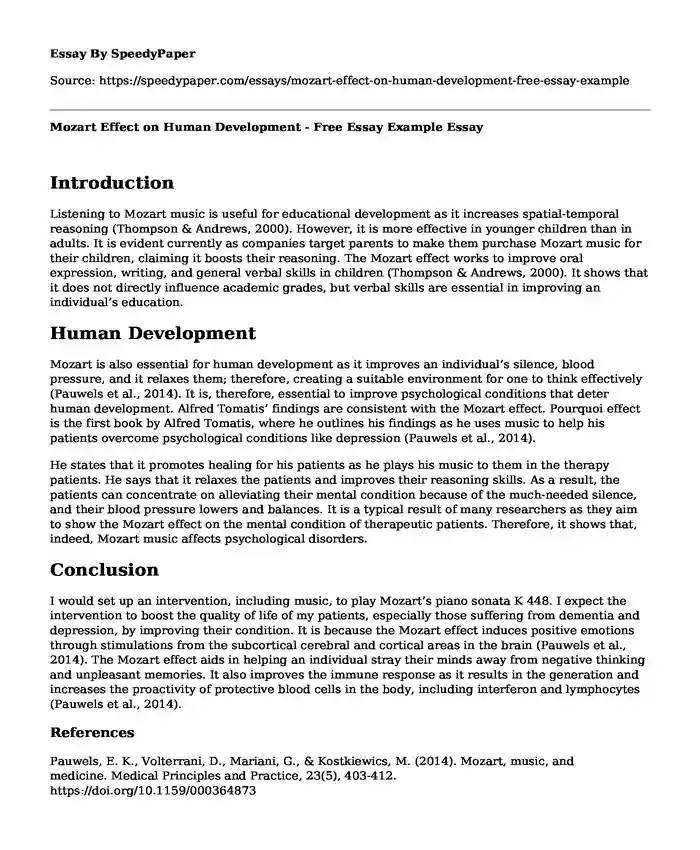
| Type of paper: | Essay |
| Categories: | Music Education Human development |
| Pages: | 2 |
| Wordcount: | 449 words |
Introduction
Listening to Mozart music is useful for educational development as it increases spatial-temporal reasoning (Thompson & Andrews, 2000). However, it is more effective in younger children than in adults. It is evident currently as companies target parents to make them purchase Mozart music for their children, claiming it boosts their reasoning. The Mozart effect works to improve oral expression, writing, and general verbal skills in children (Thompson & Andrews, 2000). It shows that it does not directly influence academic grades, but verbal skills are essential in improving an individual’s education.
Human Development
Mozart is also essential for human development as it improves an individual’s silence, blood pressure, and it relaxes them; therefore, creating a suitable environment for one to think effectively (Pauwels et al., 2014). It is, therefore, essential to improve psychological conditions that deter human development. Alfred Tomatis’ findings are consistent with the Mozart effect. Pourquoi effect is the first book by Alfred Tomatis, where he outlines his findings as he uses music to help his patients overcome psychological conditions like depression (Pauwels et al., 2014).
He states that it promotes healing for his patients as he plays his music to them in the therapy patients. He says that it relaxes the patients and improves their reasoning skills. As a result, the patients can concentrate on alleviating their mental condition because of the much-needed silence, and their blood pressure lowers and balances. It is a typical result of many researchers as they aim to show the Mozart effect on the mental condition of therapeutic patients. Therefore, it shows that, indeed, Mozart music affects psychological disorders.
Conclusion
I would set up an intervention, including music, to play Mozart’s piano sonata K 448. I expect the intervention to boost the quality of life of my patients, especially those suffering from dementia and depression, by improving their condition. It is because the Mozart effect induces positive emotions through stimulations from the subcortical cerebral and cortical areas in the brain (Pauwels et al., 2014). The Mozart effect aids in helping an individual stray their minds away from negative thinking and unpleasant memories. It also improves the immune response as it results in the generation and increases the proactivity of protective blood cells in the body, including interferon and lymphocytes (Pauwels et al., 2014).
References
Pauwels, E. K., Volterrani, D., Mariani, G., & Kostkiewics, M. (2014). Mozart, music, and medicine. Medical Principles and Practice, 23(5), 403-412.
https://doi.org/10.1159/000364873
Thompson, B. M., & Andrews, S. R. (2000). A historical commentary on the physiological effects of music: Tomatis, Mozart, and neuropsychology. Integrative Physiological and Behavioral Science, 35(3), 174-188.
https://doi.org/10.1007/bf02688778
Cite this page
Mozart Effect on Human Development - Free Essay Example. (2023, Nov 20). Retrieved from https://speedypaper.net/essays/mozart-effect-on-human-development-free-essay-example
Request Removal
If you are the original author of this essay and no longer wish to have it published on the SpeedyPaper website, please click below to request its removal:
- The House With The Ocean View and Other Artworks in a Free Essay Sample
- Avant-Garde Music Essay Example
- Free Essay - Latest Developments in Smart Phone Networks (5G and 4G)
- Paper Example. Deaf Culture vs. Hearing Culture
- Paper Example. Josquin Desprez, Gloria from Missa Pange Lingua
- Essay Sample on Positive Behavior: Strategies for Infant and Junior Schools
- Cognitive Revolution: Unifying Concepts & Physical World Through Information Processing - Essay Sample
Popular categories




